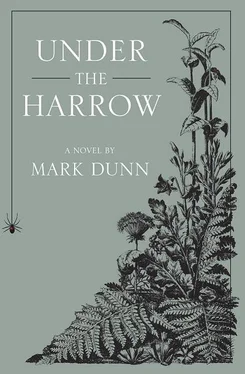“And has your group come up with answers to any of these questions beyond a simple assumption of avariciousness on the part of members of our ruling class?”
“We do not come up with answers, Trimmers. We merely formulate conjectures — strong conjectures based upon the evidence we have gathered.”
“And have you a conjecture, Muntle, for why Summit trade is kept so secretive and closely regulated beyond the fact that — as I have oft been told — one must tread easily with the Beyonder tradesmen lest they take easy offence and abandon their habitual transactions with us?”
“Yes. I will put it simply: it is a canard.”
“A canard. How do you know?”
“Come to our next meeting and ask every question you’d like. We shouldn’t be discussing such things out in the open like this.”
“Permit me to ask, though: is there a name for your little group that isn’t quite a society?”
“We don’t consider ourselves a society when in company with one another, but there is a counterfeit name that we put forth should anyone ask why we meet. We call ourselves the Fortnightly Poetry League. You see, the conceit is that we gather together to read poetry to one another.”
I smiled. “And does a poem every now and then surreptitiously slip itself into your intercourse?”
“Only when one hears a passerby through the cottage window and we are required at that moment to reinforce the illusion of our purpose. But by design, no. We have far more important things to do in the course of our short time together.”
“Permit me one last enquiry, Muntle: may I know the names of the other three individuals who make up your little hugger-mugger gathering?”
“In time, Trimmers. But not now. Come to the meeting. You’ll be surprised to discover who attends, for as it so happens, you know each of them quite well.”
Muntle looked about and gave himself some time to think and then said, “The end is coming, my good friend. There are things that we know— things that you’ll soon know, and things that ultimately we all shall know. This is why we cannot, must not look beneath Pupker’s shop. Because what Hannah Pupker saw there shouldn’t be seen by anybody else, lest it give Pupker and others who command the Dell reasons to think that there are those such as the members of the Fortnightly Poetry League who have become curious, who have become restive to know the ‘whys’ and the ‘why nots.’ For think on this, Trimmers: questioning the way of things is an exceedingly dangerous business, not to be engaged without the raising of eyebrows, or the raising of hackles, or the engendering, in the possible extreme, of the worst sort of enmity against us.
“So pray suffer me go to Pupker and make arrangements with him to visit his lower cellar at some designated point in future, for by now, he surely knows that his daughter has disclosed to you the details of her visit there, and that you have more than likely informed me as well. I shall schedule the inspection for, let us say, next Monday, and he will agree to it without hesitation, for that will afford him ample time to remove everything that is there, and the appearance of blissful ignorance on my part will preside, blissful ignorance, my dear friend, being key to the preservation and longevity of those of us who must continue to gather information methodically and incrementally, and in secret, protected communion.”
I should be grateful, I thought, to be taken so thoroughly into Muntle’s confidence. Yet with knowledge came solemn responsibility. I had known since I was a small boy that there was something quite odd about a protected valley which lay near the 41st northern parallel, in which a small collection of people lived in a sort of self-imposed quarantine in much the same way as did their forebears of five generations past. There was something quite strange about all that we had been taught about our valley home — that each element of our existence, which should feel right and comfortable and familiar, resembled nothing that was limned and conjectured about the world at large upon the leaves of the instructional volumes of the Ensyke . “But that is the world and we are Dingley Dell, and mark me, there is a great difference,” my teachers would conclude. And it was this oftarticulated refrain which echoed throughout my school days and which still reverberates against the hollow walls of my majority. It was as if we had always been living in a dream world from which one day we should all awaken; yet in waking, our sensate world would prove to be no less dreamlike and fantastical as that of our insensate state.
Chapter the Twenty-fifth. Tuesday, July 1, 2003
 arly this morning I returned to Fingerpost, ostensibly to check on my sister-in-law’s plants, but I knew the true reason for my trip: that I should perhaps be so fortunate as to meet up with Ruth Wolf in the lane, for I had thought about her more than perhaps I probably should have over the course of the previous two days. Whilst my thoughts did not rise to the level of obsession, I was at intervals quite occupied with meditations upon the woman. I would not be so bold as to go by her house and linger there in hopes that she should come out (for I figured that if she worked late hours of an evening she would not work early hours as well, and would be somewhere within the house or thereabouts). Yet something happened on my visit to Gus and Charlotte’s cottage that put thought of Ruth Wolf and all of her prepossession and redheaded pulchritude completely out of mind.
arly this morning I returned to Fingerpost, ostensibly to check on my sister-in-law’s plants, but I knew the true reason for my trip: that I should perhaps be so fortunate as to meet up with Ruth Wolf in the lane, for I had thought about her more than perhaps I probably should have over the course of the previous two days. Whilst my thoughts did not rise to the level of obsession, I was at intervals quite occupied with meditations upon the woman. I would not be so bold as to go by her house and linger there in hopes that she should come out (for I figured that if she worked late hours of an evening she would not work early hours as well, and would be somewhere within the house or thereabouts). Yet something happened on my visit to Gus and Charlotte’s cottage that put thought of Ruth Wolf and all of her prepossession and redheaded pulchritude completely out of mind.
As I approached the house, I noticed a ticket porter whom I knew by the name of Samson (a stick-boned individual not at all representative of his brawny Biblical moniker) pacing back and forth in front of the little picket fence that separated the front garden from the lane. He perked up when he saw me, and hailed me with his hand, though I had no intention of avoiding him. “Mr. Trimmers!” he called.
“Yes? What is it, Samson?”
“I’ve been waiting for your brother. I’ve knocked and knocked and he doesn’t come to the door, and I thought that perchance he was out for his morning constitutional.”
I shook my head. “Gus isn’t a ‘constitutional’ sort of fellow, Samson. More to the point, he isn’t in Fingerpost. He’s stopping in Hungerford with Mrs. Trimmers.”
Samson looked perplexed. He held out the envelope in his hand. “But how can Mr. Trimmers be in Hungerford with Mrs. Trimmers when this missive is from her to him?”
I took the envelope and looked at its inscription: ‘From Mrs. Charlotte Trimmers, Hungerford, to my dear husband Augustus Trimmers, Fingerpost.’ “It’s most curious, Samson, for my brother told me that he would be joining his wife thither just hours after her own departure for that village. May I have it?”
“If you will find him and deliver it him, I have no objection. But I cannot allow you simply to drop the envelope into this rose bush.”
“No, Samson, I assure you that I will not.”
“Because it’s marked ‘Personal Delivery,’ which means that it must be put directly into the hand of the recipient.”
“Yes, yes, Samson. I understand what the phrase ‘Personal Delivery’ means. May I have it?”
Samson relinquished the missive and I gave him five cents — a more than generous gratuity for his trouble.
I waited until the porter had left to unfold the envelope and read the personal correspondence therein between wife and husband — something I would never do without very good reason. My very good reason was confirmed by the contents of Charlotte’s note to my brother.
Читать дальше

 arly this morning I returned to Fingerpost, ostensibly to check on my sister-in-law’s plants, but I knew the true reason for my trip: that I should perhaps be so fortunate as to meet up with Ruth Wolf in the lane, for I had thought about her more than perhaps I probably should have over the course of the previous two days. Whilst my thoughts did not rise to the level of obsession, I was at intervals quite occupied with meditations upon the woman. I would not be so bold as to go by her house and linger there in hopes that she should come out (for I figured that if she worked late hours of an evening she would not work early hours as well, and would be somewhere within the house or thereabouts). Yet something happened on my visit to Gus and Charlotte’s cottage that put thought of Ruth Wolf and all of her prepossession and redheaded pulchritude completely out of mind.
arly this morning I returned to Fingerpost, ostensibly to check on my sister-in-law’s plants, but I knew the true reason for my trip: that I should perhaps be so fortunate as to meet up with Ruth Wolf in the lane, for I had thought about her more than perhaps I probably should have over the course of the previous two days. Whilst my thoughts did not rise to the level of obsession, I was at intervals quite occupied with meditations upon the woman. I would not be so bold as to go by her house and linger there in hopes that she should come out (for I figured that if she worked late hours of an evening she would not work early hours as well, and would be somewhere within the house or thereabouts). Yet something happened on my visit to Gus and Charlotte’s cottage that put thought of Ruth Wolf and all of her prepossession and redheaded pulchritude completely out of mind.










